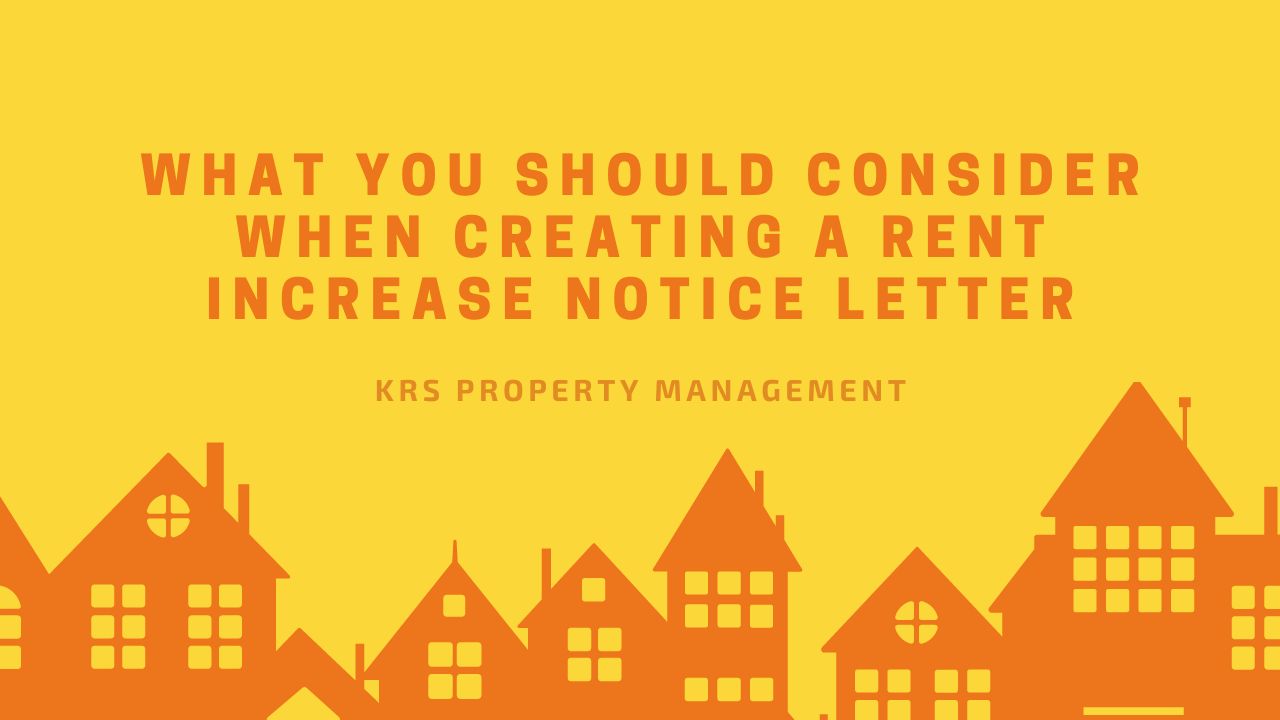
Rent increase notices are a critical aspect of landlord-tenant relations, impacting both parties' financial stability and expectations. Crafting such notices requires careful consideration of various factors to ensure fairness, legality, and effective communication.
This comprehensive guide by KRS Property Management explores key points to consider when creating a rent increase notice letter, covering justifications for a rent increase, the appropriate notice period, legal limits on rent hikes, methods for calculating a rent increase, and the impact on security deposits.
What Is a Rent Increase Letter For?
A rent increase letter serves as a formal notification from a landlord to a tenant informing them of an upcoming raising rent. It outlines the new rental amount, the effective date of the increase, and any justifications for the adjustment.
Rent increase notice letters are crucial for maintaining transparency and fostering clear communication between a landlord and tenants. They also serve as a vital document should legal disputes occur.
Justifications for Rent Increases
Before issuing a rent increase notice, a landlord must justify the decision to raise the rent. Several factors may warrant an increase:
Rising Inflation
Inflation, as a persistent increase in the general price level of goods and services over time, has far-reaching implications for various aspects of the economy, including the rental housing market. As the purchasing power of money declines, landlords often find themselves facing higher costs for maintaining and operating their rental properties. In response, raising rent rates to offset the effects of inflation and preserve the property's value relative to prevailing market conditions.

Higher Utility Bills and Maintenance
An increase in utility costs or maintenance cost represent significant operational expenditures for a landlord, directly impacting their bottom line and financial viability. These expenses encompass a wide range of utilities such as water, electricity, gas, and waste management, as well as ongoing maintenance activities like repairs and property improvements.
When faced with escalating utility bills or the need for costly repairs or upgrades, landlords may find it necessary to implement a rent hike to offset these any additional cost and maintain the property's financial sustainability.
Rental Property Improvements
Investments in property upgrades or renovations represent a strategic move by landlords to enhance the value, attractiveness, and functionality of their rental units. These improvements can take various forms, ranging from cosmetic enhancements like fresh paint and updated fixtures to more substantial renovations such as kitchen remodels, bathroom upgrades, or energy-efficient installations.
The aim is not only to maintain the property's competitive edge in the rental market but also to provide tenants with improved living standards and amenities. Tenants typically expect higher rents for properties with improved features or enhanced living conditions.
Increased Property Taxes
Rising property taxes pose a significant financial challenge for landlords, particularly those who own multiple rental properties. These taxes represent a substantial portion of landlords' operating expenses, alongside maintenance, insurance, and mortgage payments. When property taxes increase, landlords often find themselves facing higher overhead costs, which can directly impact their profitability.

To mitigate the impact of increased property taxes on their bottom line, A landlord may opt to adjust rental rates accordingly. A Rent increase can become a strategic response to offset the additional financial burden imposed by rising taxes.
How Much Notice Should Landlords Give Tenants?
Providing tenants with sufficient notice of a rent increase is essential to afford them time to adjust their budgets or explore alternative housing options. The appropriate notice period varies by jurisdiction and may also be influenced by lease agreements or local rental regulations. However, a common practice is to provide tenants with a 30 to 60-day notice before the rent increase takes effect meaning 30-60 days after the date.
What Is the Maximum Rent Increase Allowed?
Legal restrictions govern the maximum allowable rent increase, which varies by location. Some jurisdictions impose rent control measures or establish limits on annual rent hikes to protect tenants from an excessive rent increase. A Landlord must familiarize themselves with local laws and regulations to ensure compliance when raising rents and providing a notice. It should also be noted that these laws are subject to change so make sure to remain up-to-date on any policy changes.
How Can You Calculate a Monthly Rent Increase?
Determining the amount of a rent increase involves considering various factors, including the rental marketplace, lease conditions, and the desired increase in revenue.
Rental Marketplace
Assessing rental market trends and comparable properties in the area helps landlords gauge the appropriate rental rate for their units. Factors such as location, amenities, and demand for rental properties influence market rents.

Lease Conditions
Existing lease agreements may stipulate conditions or limitations when raising rental rates. The Landlord must review lease terms to ensure any proposed rent increase complies with contractual obligations and legal requirements.
Amount of Money
Calculating the specific dollar amount of a rent increase depends on factors such as the percentage increase desired by the landlord and the current rental increase. Landlords should aim for a balance between maximizing rental income and maintaining tenant satisfaction and retention.
Do Rent Increases Affect the Security Deposit?
Rent increases generally don’t directly impact the security deposit held by the landlord. Security deposits are separate from rent payments and serve as financial protection against unpaid rent or property damages to date. However, if the rent increase results in a higher monthly rent, tenants may need to adjust their security deposit amounts to reflect the new rental increase when renewing or entering into a new lease agreement.
Bottom Line
Creating a rent increase notice letter requires careful consideration of various factors, including justifications for the increase, the appropriate notice period, legal limits on increases, methods for calculating increases, and the impact on security deposits. By adhering to these considerations, landlords can effectively communicate rent adjustments while maintaining positive relationships with their tenants and ensuring compliance with relevant laws and regulations.
If you need help managing your rental investment consider partnering with a trusted company like KRS Property Management. Contact us today to learn more about our property management services!






